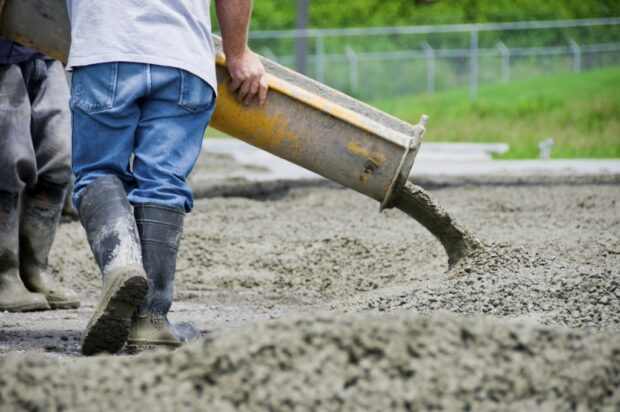You can pour asphalt yourself. You can spread gravel yourself. In fact, you can even lay pavers yourself.
But you may not be able to pour concrete yourself correctly.
Concrete is way more complicated than most of its contemporaries. As such, any construction process involving concrete must be handled with the right skill-set to avoid aesthetics, safety, and construction blunders.
But in case you still want to do your home’s concrete pouring yourself, here is a list of reasons to convince you otherwise.

You don’t know how to prepare the soil
Pouring a concrete driveway or patio is not as simple as weeding off plants, clearing the area with a shovel, and then leveling with any tool you can lay your hands on.
First of all, the soil upon which your concrete will sit has to be examined and prepared in detail; otherwise, any concrete constructed on it will crack or crumble in little to no time.
When the soil upon which you want to construct isn’t tightly packed (loose soil), the soil will give away once it settles, causing the concrete sitting on it to cave in.
To create a firm soil base, you’ll need a plate compactor to carefully level the surface and tighten the borders.
Most concrete construction companies have this tool, and they also have the know-how required to use it.
You may not understand the relationship between concrete and weather
Concrete is highly sensitive to weather. In the hours before and after pouring your concrete, if the prevailing weather condition isn’t favorable for concrete, the appearance and strength of the finished surface (be it a walkway, patio, or entrance) may be ruined.
A professional Melbourne concreter, however, understands the relationship between concrete pouring and prevailing weather conditions. They know when to pour, at what temperature to pour, when to use air-entrained concrete (mostly during freeze conditions in winter), and when not to pour at all.
Remember, the prevailing weather condition at which you pour your concrete is what will determine the strength and final appearance of your concrete surface.
You don’t have the right tools
Most DIY concrete pouring homeowners rely on simple handy tools such as wheelbarrow and shovel. These tools are not ideal for pouring concrete because they leave you with an uneven surface and lead to bumps, holes, and cracks.
Since pouring concrete is time-sensitive, it’s critical that you have everything you need on hand before you begin mixing your concrete. Unfortunately, this can be hard if all you have is a wheelbarrow and shovel to transport and mix sand, gravel, and the rest.
In contrast, professional concreters mix all the necessary materials together at once (sand, gravel, cement, and water) using standard concrete mixers.
You don’t know the right ratio of water to dry concrete
Most homeowners who pour concrete use their discretion to quantify the amount of water to add to the dry concrete.
This is a terribly grave mistake, one that has resulted in many poor concrete constructions.
Before you proceed to mix materials together, it’s important to know the exact ratio of dry concrete and water to add. Without this ratio, you risk adding too much water (leading to a weakened mixture) or too little water (leading to a chunky mixture).
Remember, wet concrete should not be runny or chunky. Instead, it should be smooth and malleable.
It is not safe
Even though concrete is a relatively safe material to work with, you still need to exercise the utmost caution when handling it. You have to equip yourself with some necessary tools to protect your eyes, ears, respiratory system, and skin when mixing and pouring concrete.
This is important because while trying to mix materials to form dry concrete, it’s not impossible to inhale cement dust, which is a highly hazardous substance for the human respiratory system.
But since you may not be able to afford the cost of renting or buying these protection tools, it will be best you contract your concrete pouring project to a professional concreter.
Think about it; wouldn’t you rather spend a few hundred dollars on hiring someone to do a job than to take up the job, risk your health, and spend thousands of dollars on treatments later?



